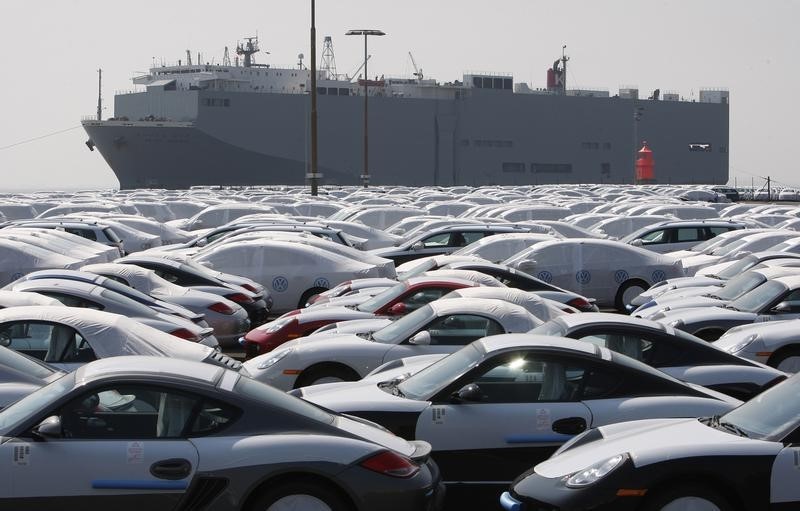By Andreas Cremer and Jan Schwartz
BERLIN/HAMBURG (Reuters) - Volkswagen (DE:VOWG) has shelved plans to overhaul the management of its North American business and will not address its future strategy there until it has reached legal agreements over its rigging of emission tests, two sources familiar with the matter said.
Volkswagen has long been struggling in the United States and the country became the focus of the biggest business crisis in its 78-year history last month when American authorities exposed its use of "defeat device" software to cheat diesel emission tests.
The German carmaker now faces intense U.S. legal scrutiny including more than 300 lawsuits, mainly from individual drivers of its diesel cars, and investigations by Congress, the Department of Justice and the Environmental Protection Agency.
It picked group veteran Winfried Vahland as its North American chief last month, before the emissions crisis erupted, as it pushed a policy to cede more power from its German HQ to regional and car brand divisions.
But the former Skoda boss quit VW three weeks later, as the scandal raged. The 58-year-old, who had been considered a possible replacement for Martin Winterkorn as VW group CEO, had unspecified "differences of opinion" over the organisation of the North American business.
Volkswagen has no plans to appoint a new head for North America until it has survived the legal assault by coming to agreements with plaintiffs and regulators, according to the sources, who said that this could take months.
"What matters more than anything else right now is to sort out this disaster," one source said.
"If we fail to do that, then questions that are completely different (than the future U.S. leadership) will come up," he said, declining to elaborate.
The carmaker could go as far as to stop selling VW brand diesel models in the United States, should it incur heavy regulatory and financial penalties, one source said. VW brand's diesel models accounted for 22 percent of last year's 366,970 U.S. deliveries.
A third source said Volkswagen would, however, stand by plans to invest $900 million at its U.S. plant in Chattanooga, Tennessee to build a new mid-sized sport-utility vehicle.
A spokesman at VW's Wolfsburg headquarters declined to comment on the company's North American plans.
'PERSONALITY NEEDED'
A lack of a replacement for Vahland could create further uncertainty for VW in the United States, where it has failed to narrow a sales gap with General Motors (N:GM), Ford and Asian rivals such as Hyundai and Toyota.
Analysts say it needs a clear, long-term strategy for the U.S. market to avoid the kind of mis-steps that saw it being too slow to redesign models to cater for American tastes.
Vahland's departure leaves Michael Horn - the head of VW's U.S. division for fewer than two years, who was left to explain the test-rigging to Congress this month - to head that business for the foreseeable future.
Analysts expect Volkswagen to report a 3.5 billion-euro ($3.9 billion) operating loss for the third quarter on Wednesday, its first quarterly deficit in years. It has set aside 6.5 billion euros in provisions to cover the consequences of the emissions scandal.
The carmaker agreed a new management structure for the 12-brand group on Sept. 25, including creating a new role on the VW brand's management board for North America to oversee model strategy and production in the United States, Mexico and Canada.
But the sources said this drive had now been overtaken by events and the North American plans were on hold.
Leaving the newly created top job for North America vacant could sow further tensions with VW's powerful works council, which has criticised management in the past for failing to tune in to U.S. tastes and being slow to refresh models.
"A strong president for North America must be a personality with U.S. experience," a works council spokesman said. "We trust that the management board will take a decision with this in mind."
Similarly, rating agency Moody's, which last month lowered VW's credit ratings outlook to negative from stable, said it expected the company to announce a new North America chief soon "given the challenges facing the company in that region".
It welcomed the company's wider plan to decentralise power from Wolfsburg as likely to enhance its agility.
Differences of opinion on U.S. strategy was a big issue in the clash in April between former Chief Executive Winterkorn and ex-Chairman Ferdinand Piech that resulted in Piech's exit.
"It's obvious that VW is devoting all efforts to contain the crisis but they need a strong management team in the U.S. now," said Stefan Bratzel, head of the Center of Automotive Management think-tank near Cologne.
"They have no time to lose."
